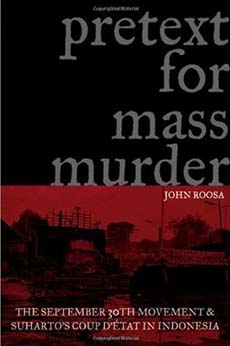Pretext for Mass Murder: The September 30th Movement and Suharto's Coup D'Etat in Indonesia by John Roosa

get from Amazon Pretext for Mass Murder
John Roosa
Pretext for Mass Murder: The September 30th Movement and Suharto's Coup D'Etat in Indonesia (New Perspectives in Southeast Asian Studies)
From Publishers Weekly
On October 1, 1965, a group of Indonesian soldiers calling themselves "the September 30th movement" kidnapped and killed several high-ranking officers, claiming that they were preventing a plot against the president. But the movement itself was swiftly defeated, and another army general, Haji Suharto, took the opportunity to accuse the Communist Party of trying to overthrow the government. Seizing power for himself, he would rule Indonesia for more than three decades. The alleged Communist plot was a key element in Suharto's national mythology, but as Roosa explains, the haphazardness of the September 30th movement's actions has always provoked questions about its real motivations. His research, including a previously ignored account of the plot's shortcomings by one of its advisers, suggests that the truth lies close to the easiest explanation. The September 30th movement was not a coup, Roosa asserts, but an attempt to purge the Indonesian government of anti-Communist influences that failed because it was "a tangled, incoherent mess." Roosa's historical reconstruction is painstakingly detailed, yet laid out in a clear narrative. While some questions remain unanswered, his scenario provides a rational explanation for much of the chaos the political upheaval engendered.
Copyright © Reed Business Information, a division of Reed Elsevier Inc. All rights reserved. -- Dieser Text bezieht sich auf eine andere Ausgabe: Gebundene Ausgabe .
Synopsis
In the early morning hours of October 1, 1965, a group calling itself the September 30th Movement kidnapped and executed six generals of the Indonesian army, including its highest commander. The group claimed that it was attempting to preempt a coup, but it was quickly defeated as the senior surviving general, Haji Mohammad Suharto, drove the movement's partisans out of Jakarta. Riding the crest of mass violence, Suharto blamed the Communist Party of Indonesia for masterminding the movement and used the emergency as a pretext for gradually eroding President Sukarno's powers and installing himself as a ruler. Imprisoning and killing hundreds of thousands of alleged communists over the next year, Suharto remade the events of October 1, 1965 into the central event of modern Indonesian history and the cornerstone of his thirty-two-year dictatorship. Despite its importance as a trigger for one of the twentieth century's worst cases of mass violence, the September 30th Movement has remained shrouded in uncertainty. Who actually masterminded it? What did they hope to achieve? Why did they fail so miserably? And what was the movement's connection to international Cold War politics?
In "Pretext for Mass Murder", John Roosa draws on a wealth of new primary source material to suggest a solution to the mystery behind the movement and the enabling myth of Suharto's repressive regime. His book is a remarkable feat of historical investigation.
| Attachment | Size |
|---|---|
| massm.jpg | 28.71 KB |
- Editor1's blog
- Login to post comments